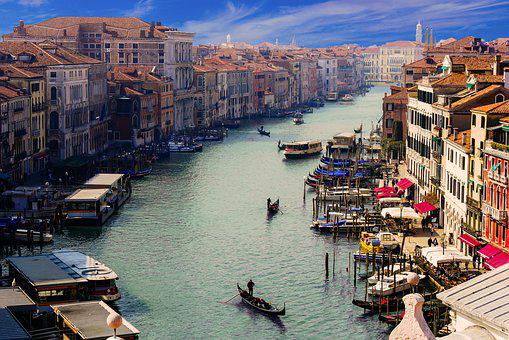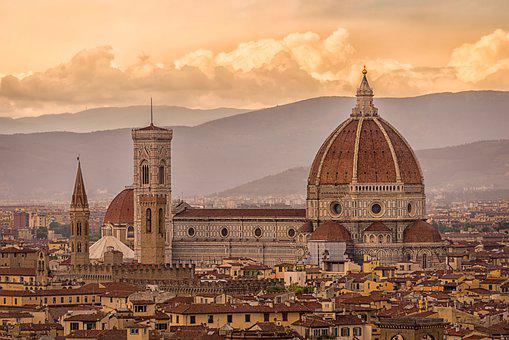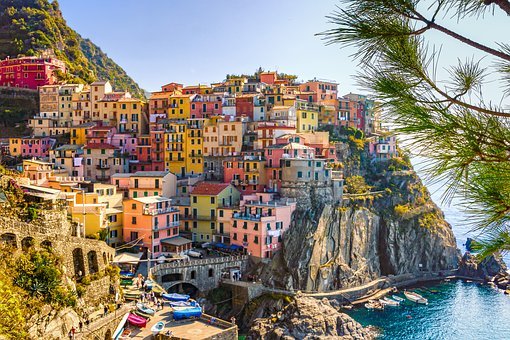Italy, a country steeped in history, has made substantial contributions to the art, fashion, architecture, film, opera, literature, and design industries of the world.
But, much more important than this, is the contribution Italy has made to the culinary world.
Italian cuisine is considered to be one of the top forms of cuisine in the world.
From pizza, pasta, coffee, and ice cream, to risotto and polenta.
If you are considering the move to Italy, you may want to take some of the advantages and disadvantages of immigrating to this beautiful nation into consideration first.

Contents
The Pros of Living in Italy
1. Great food
Many fine dining establishments around the world head hunt Italian executive chefs to work in their kitchens.
And there’s a very good reason for that.
Italian cuisine is focused on fresh ingredients and the cuisine itself is considered to be one of the best in the world.
Ingredients are often sourced locally and have a focus on cooking the way grandma used to cook.
Imagine eating Italian cuisine every day.
Living in Italy means that a fresh risotto is just around the corner at the local cafe.
You will be feasting on Mediterranean-style food for breakfast, lunch, and dinner.
And, if you are concerned about a high carb intake due to this type of diet, do not worry too much, as a healthy diet consists of approximately 45% to 65% carb intake.
Furthermore, you will be very pleased to know that GMO crops are forbidden in Italy, which means that you will be eating organic and will not have to be concerned about any GMOs in your food.
2. Excellent wine
Italian wine, much like French wine, is known as old-world wine.
That is because the wine-making trade originated in this part of the world and these countries have perfected the art of winemaking.
Italy has been producing wine for more than 4,000 years.
The country is known as the perfect place to produce wine, due to its climate.
The climate in Italy is actually ideal for viticulture.
And, Italy is the world’s largest producer of wine, having contributed 48.3 million hl of wine during the 2013 to 2017 period.
Italy is known for producing some of the most widely known and exceptionally delicious wines in the world.
If you are a wine connoisseur, you will love living in this part of Europe.
The most exciting part is that Italian wine is produced in every region of the country.
You will not have to travel far to find a good bottle of wine in this part of Europe.
One of the reasons that the wine is so good in Italy is the fact that the standards are exceptionally high.
There are three grape varietals that Italy is known for:
- Sangiovese
- Trebbiano
- Montepulciano
If that is not enough reason, you may be excited to know that Italian wine pairs beautifully with pasta.
Especially red-based pasta.
3. Affordable cost of living
According to Housinganywhere.com, Italy is one of the cheapest places to live.
The site goes on to explain that it is the fourth cheapest place to reside in Western Europe.
The site looked at the cost of everyday expenses, including housing which had an average price of €860 for an 85 m2 residence, utilities which averaged at €138, groceries of €300, and public transport for €35 on average.
The total monthly expenses, including items that included internet, leisure, and fitness, amounted to €1606.
It needs to be mentioned that the salaries match the cost of living, with more international cities like Rome, Milan, and Florence being more expensive to live in than smaller cities and towns.
4. Good healthcare
Medpagetoday.com reports that Italy ranks in the top ten positions, internationally, by the World Health Organization for its healthcare system.
The site goes on to explain that while the healthcare system in Italy may not be perfect, the rating for their system is based on factors such as:
- Equal access to healthcare for all citizens
- Life expectancy
- Health rate of citizens
The NHS in Italy is tax-funded. Healthcare service coverage is universal and free to all citizens at the point of contact.
In addition, the system is regionally based with regions differing in socioeconomic levels, size, and population.
Visits to general practitioners are free of charge.
However, if and when patients require services from a specialist, it may take a while to get an appointment with the average wait time is two months.
5. Inviting culture
In general, Italians are very warm and hospitable people.
But you may find some reviews indicating that they are either warm and welcoming or the complete opposite.
Italy is easily one of the top five tourist destinations in the world and this has a lot to do with Italian hospitality.
That’s because you get what you give in this culture.
Italians are very responsive to how they are approached and are generally only rude if they have been offended.
But, generally speaking, this is a very kind, accommodating culture.
Italians are quick to lend a helping hand to family, friends, and even strangers.
They are especially accommodating to people who are willing and eager to learn about their culture.
Cons of Living in Italy
There are undoubtedly more advantages to living in Italy, but let’s have a look at some of the disadvantages for ex-pats making the move to Italy.
1. English is not the first language
Italy, especially northern Italy, is pretty cosmopolitan when it comes to a thriving community of ex-pats.
However, do not be fooled.
English is not the first language in this country, and even though many visitors and ex-pats speak other languages, predominantly English, you will need to learn, at least some, Italian if you plan to move to Italy.
Many Italians do speak some English, albeit broken English, but it is not enough to be able to effectively communicate with them.
You will be required to learn the language in order to communicate with the Italians.
And, speaking, some Italian will not suffice.
You should at least be somewhat fluent.
Italians will be quite offended at you living in their country and not making the effort to learn their language.
2. Dirty
Seeing pictures online, on television, or in promotional advertisements of Italy, you may be met with beautiful sunsets, rolling hills in Tuscany, quaint little cafes serving delicious food, or gondoliers powering gondolas through the canals of Venice, but this is hardly a true reflection of most of the bigger cities and some of the more rural towns in Italy.
Italy is a very old country.
Some of the more metropolitan cities are known for being somewhat grimey.
This is especially true for high-volume tourist cities such as Rome, Florence, and Milan, which are known for having garbage strewn across the streets, especially close to tourist destinations.
In fact, Rome has earned itself the unsought-after title of being the filthiest city in Europe due to its massive garbage problem.
The cities in Italy may not be as dirty as other international cities like France or New York, but it does not resemble the image portrayed in movies.
3. Job shortages
If you are in the market for seasonal work in a bar, hotel, or restaurant, you will be pleased to know that there is a lot of work in Italy.
However, if you are more serious about finding permanent employment, you may find that it is not as easy to break into the full-time job market in this country.
Because there is such a language barrier, the problem is further exacerbated.
You will come to find that all of the best or high-paying jobs are reserved for Italians.
It may be best advised to try and secure a job before making the move to Italy.
4. Rental leases are very long term
If you plan to make the move to Italy, it is best advised to have all of your ducks in a row.
Will you buy a property or will you be renting?
The problem with the leasing market is that most rental accommodation leases are for three years or longer.
There is the possibility of a transit lease which is for 18 months.
But, for the most part, you won’t find a rental lease for less than three years.
If you do make the decision, after a while, that the accommodation does not suit your needs, or you need to move, then getting out of that rental lease is going to be quite a costly affair.
5. High school curriculums
This may be an advantage or a disadvantage, depending on how you look at it.
High schools do not teach from a holistic curriculum as most schools do.
The curriculum per school will depend on what the focus of that school is.
The schools offer specialized curricula and children as young as 14 will be faced with a decision that will impact the rest of their lives as the high school selected will affect what the learner is able to study at university.
Children will need to select a high school that offers subjects in a field that interests them the most.

Pros and Cons of Living in Italy – Summary Table
| The Pros of Living in Italy | Cons of Living in Italy |
|---|---|
| 1. Great food | 1. English is not the first language |
| 2. Excellent wine | 2. Dirty |
| 3. Affordable cost of living | 3. Job shortages |
| 4. Good healthcare | 4. Rental leases are very long term |
| 5. Inviting culture | 5. High school curriculums |
Italy Safety Overview
READ THE FULL REPORT: Italy Safety Review
Safety Index:
- OVERALL RISK: MEDIUM
- TRANSPORT & TAXIS RISK: MEDIUM
- PICKPOCKETS RISK: HIGH
- NATURAL DISASTERS RISK: MEDIUM
- MUGGING RISK: MEDIUM
- TERRORISM RISK: MEDIUM
- SCAMS RISK: MEDIUM
- WOMEN TRAVELERS RISK: MEDIUM
Frequently Asked Questions
What is Italy most known for?
Italy is known for quite a few things.
Firstly, the country is known for the Renaissance.
But more specifically, Italy is known for the amazing artists produced during this period.
Furthermore, Italy is very well known for football, tourism, and the unique scenery in the rural areas of Italy.
And, if there are three things about Italy that truly stand out to the world, they are fashion, brands, and opera.
Is crime a problem in Italy?
Italy is known for having very low levels of violent crime.
The more metropolitan cities may have higher rates of crime, such as Milan, Rome, and Lombardy.
Property crime in Italy seems to be higher than violent crime.
But this will also depend on where you go.
What is the most common type of crime in Italy?
Pickpocketing is a big problem in Rome and Milan.
Other crimes that are popular include burglary, robbery, and theft.
Does it snow in Italy?
Italy has a Mediterranean climate, but the northern parts of Italy are also known for their icy winters and do experience some snow during the winter months.
Is Italy safer than the US?
Yes, according to the Global Peace Index, Italy is placed at 31 on the global scale for safety.
This puts Italy well ahead of other developed countries such as the UK and the USA.












Italy offers a rich cultural experience with its history, art, and cuisine, but it also has some challenges such as language barriers and job shortages for expats.
Living in Italy is a gastronomic delight with fresh, organic food and world-class wines at every corner; however, the language barrier can be challenging and city cleanliness leaves much to be desired.
Living in Italy is a dream come true for food lovers, but the high cost of living can be quite challenging.
We were just there and did travel around a lot in the Tuscany region. I did not find anything dirty anywhere we went. I did find the cost of living in Florence was outrageous. I don’t see how anyone can eat out as a tourist without going broke within days. Prices, which are for ONE part of the meal, are high, so if you want potatoes with your meat, you have to pay extra, as for tap water and even for the privilege of sitting at a table and getting napkins and silverware. Groceries at the market were a much better deal if you have a place to cook. The people were almost always very kind, friendly and helpful, even the young adults and adolescents which is a contrast to here where young people all have such an attitude. I’d love to live there if I can could find the right little town right next to a bigger one to get my necessities.